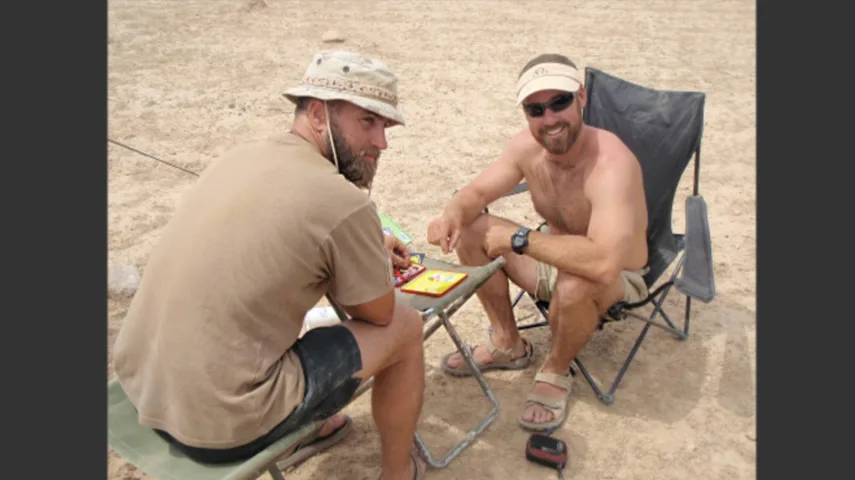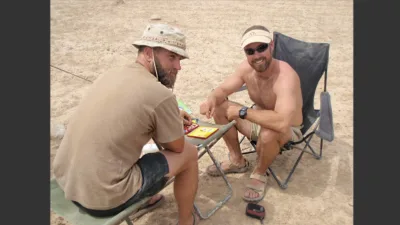Why this ex-Army duo switched to financial advice



For ex-Australian Army commandos Warren Loudon and David Vaughan, ingrained discipline and principled decision-making from almost a decade in the Special Forces have given them a special edge in the financial advisory space.
The veterans set up their own business Loudon & Vaughan Private Wealth in late 2016 to improve access to high quality, personal financial advice.
Business launch
Getting into the industry seemed a natural progression upon returning to civilian life.
Vaughan’s background was in banking, with six years under his belt in futures and foreign exchange at Deutsche Bank and Rabobank. He also has a Bachelor of Commerce (Deakin) and a Master’s in Financial Planning (UNSW).
Meanwhile, Loudon had been involved in the financial services industry since 2012 and had begun his financial planning education in between missions in Afghanistan. He completed a Diploma of Financial Planning, Advanced Diploma of Financial Planning, Graduate Diploma of Financial Planning and is an AFA Fellow Chartered Financial Practitioner (FChFP).
Loudon & Vaughan Private Wealth are now partnered with Walker Lane, a boutique advisory and investment management firm, as their licensee. They previously worked with larger licensees like Synchron and Fortnum.
The appeal for a licensee like Walker Lane, they said, was a smaller and younger team.
“The average age [here] is around 40 years old and the difference is, we don’t come from the ‘old days’ of different rules. Instead, we’re all more like-minded in our approach,” Loudon observed.
“After all, rules change all the time. Let’s see what happens with the [Quality of Advice review] in a few weeks.”
Working with clients
As the managers of around $110 million now for some 180 clients, the duo found themselves utilising skills they acquired in the military on a daily basis.
In particular, many of their clients include other veterans who only had a short-term plan upon discharge.
“A lot of the people we deal with have been medically discharged, which we both have done. Going through that process can be quite scary and it’s like cutting an umbilical cord,” Vaughan said. “There are two types of people who come out of that: playing the ‘broken soldier’ for the rest of your life or those who go on to achieve new things or retrain, as we have done.”
They encourage their clients to think beyond the first year of civilian life, asking questions like ‘what is the next stage?’ and ‘what is the next career?’ to help them find more long-term solutions.
Being a financial adviser can even feel like being a life coach sometimes, they said.
“There’s such a big process to go through. When people are discharged, there is a pension through the superannuation scheme, that’s a whole different beast, and then there’s the Department of Veterans’ Affairs to assign points, and it’s like no one talks to the other!
“We know the process personally and when we give our clients simple dot points on how this works, they say ‘wow, I was never told that by anyone’,” noted Vaughan.
Similarities with the Army
When it came to running the business, the pair said there were numerous transferable skills from the Army.
“Every mission we did overseas was based on setting a plan. But plans would often change, and you suddenly have to adapt. We’d go in with one idea in our head but as soon as something happened, we had to have Plan B, C, D, even E,” recalled Vaughan.
Serving in the Special Forces 2nd Commando Regiment alongside Loudon made him no stranger to thinking on his feet, he said.
Loudon added: “In the Special Forces, you’re expected to be smart, to add value to the team, so you’re not just doing what you’re told. You have to think – why are we doing this? Is there a better way to work? Could I be doing this differently?”
Another commonality between the two professions was the use of uncommon terms and lingo, which can often be confusing.
He added: “The Army has their acronyms, the finance space has their acronyms, and we now feel like we’re bilingual, converting this to ‘normal speak’ for our clients.”
Dealing with regulation
Their military background also helped when it came to abiding with rules and regulations of the advice industry.
Vaughan recalled an incident when he was instructed by his commander to move a pile of large sandbags to a different post 200 metres away, and after breaking a sweat completing the task, he was told to simply move them right back where they had been.
“It’s how they build character. It seems silly, but it’s something you just have to just do,” he elaborated.
“Half the [advice] industry may have left but when we’re given another form to complete, it’s just another task on our checklist. It can be frustrating, but you learn to roll with the punches.”
Ultimately, though, they believed continuing to help people even after Army life remained the best part of their jobs.
“[Clients are] articulating what they’re thinking and feeling, but we’re turning it into something tangible. It might be helping them plan retirement in the best way possible or the best way to sell or transfer an asset, but at the end of the day, it’s about helping people,” Loudon smiled.
Recommended for you
The rise of private credit funds is giving research houses cause for concern about their viability for retail and wholesale investors and necessitating changes to their research process.
The rebranding of the AMP advice division to Akumin brings to an end a 176-year history for the firm and provides a fresh start for advisers under Entireti.
With alternative funds being described as “impossible” for fund managers to target towards advisers without the support of BDMs for education, Money Management explores the evolving nature of the distribution role.
Commentators say the lack of transparency in private markets is making it difficult for fund managers and advisers to assess them from an ESG perspective.















